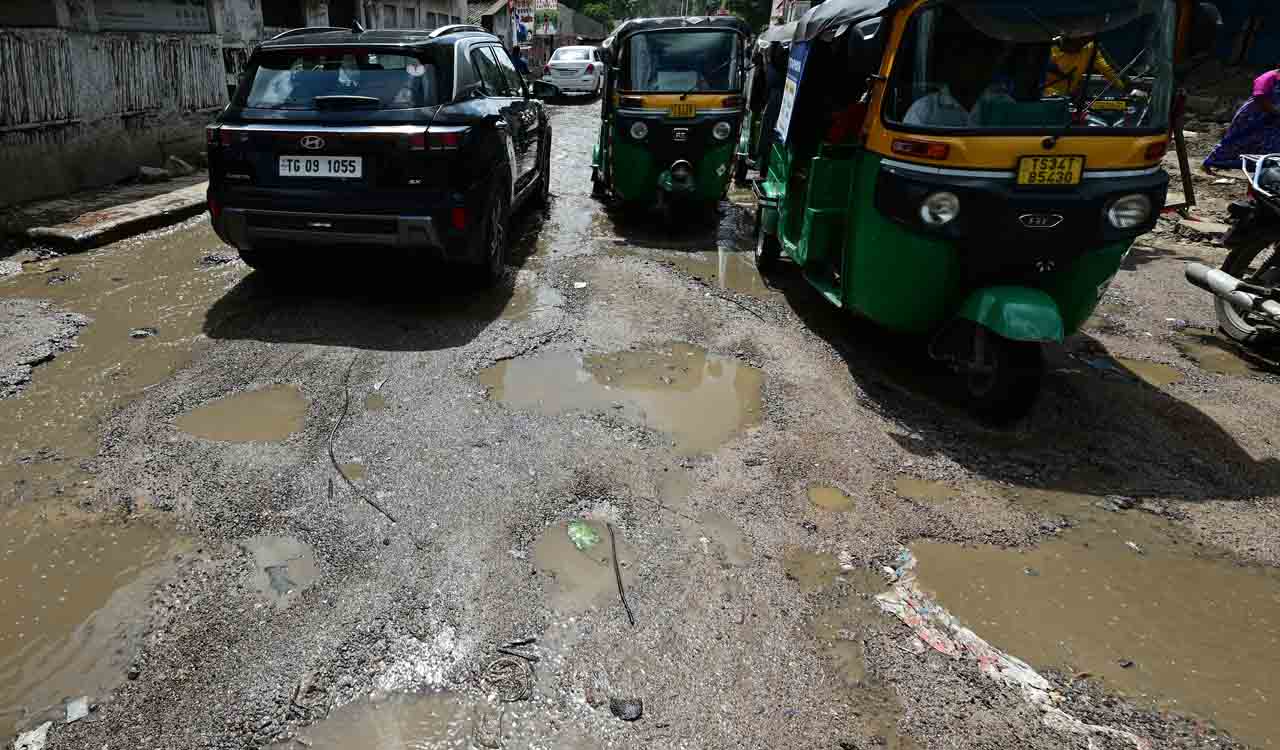Opinion: India’s pothole problem — A gaping hole in governance
When roads crack, so does public trust. India’s potholes are less about asphalt and more about accountability

By Chitra Saruparia
Over the past week, two of India’s tech cities, Hyderabad and Bengaluru, were rocked by protests that were unrelated to data centres or AI start-ups. The trigger was potholes.
Also Read
On Bengaluru’s Hosa Road and Jail Road, hundreds of residents gathered to demand repairs. At Varthur-Gunjur, outrage erupted after a pothole-related accident claimed a life. Protesters demanded not just smoother roads but traffic lights, proper turning points, and long-term planning. Their argument was simple: as taxpayers, they had a right to safe infrastructure.
In Hyderabad, too, crowds poured into the streets over deteriorating road conditions. Sometimes, they come up with novel protests to highlight the dangers caused due to pothole-ridden roads. At first glance, these protests might seem like routine civic unrest. But they signal something deeper: potholes are not mere inconveniences. They are visible cracks in the governance of Indian cities.
The Economics of Neglect
Economists often describe pothole repairs as ‘regrettable expenses’ because the money spent does not create new value. It merely fixes existing damage. However, the ripple effects of neglect are enormous.
Vehicle owners pay the first price. Tyre bursts, suspension failures, and wheel misalignment push up maintenance costs by 20-30 per cent in some cities. For a family dependent on a two-wheeler, that can mean choosing between servicing the bike or paying school fees.
The costs escalate when lost time is factored in. An Indian Institute of Technology (2022) study revealed that poor road conditions could cost the Indian economy over Rs 30,000 crore annually in lost productivity and vehicular damage. Each extra half-hour spent dodging craters or taking detours acts as a hidden tax on workers and firms. Ironically, India’s Silicon Valley is losing efficiency due to broken roads.
Beyond Economics
The tragedy goes beyond economics. According to the National Crime Records Bureau, 2,161 people died in pothole-related accidents in 2023, which is a 16 per cent increase from the previous year. That means, on average, six Indians die every day because of potholes. These are not ‘accidents’ in the truest sense; they are predictable consequences of state neglect. Between 2019 and 2023, India reported over 9,000 deaths due to potholes. Behind every number is a family bearing medical costs, lost incomes, and unbearable grief.
Zoom out, and potholes act as growth-killers. Logistics costs rise when trucks slow down or reroute. Consumer prices creep up as inefficiencies multiply. Foreign investors tend to hesitate when infrastructure appears unreliable. According to a World Bank study, road crashes are estimated to cost the Indian economy between 5 per cent and 7 per cent of its GDP annually.
Thus, every pothole is an invisible tax. Citizens pay more, businesses lose time, and the economy slows, all because of something preventable.
Law and Accountability Gap
India is not without legal recourse. Article 21 of the Constitution guarantees the Right to Life, which courts have interpreted to include safe infrastructure. The Bombay High Court has ordered urgent road repairs during the monsoon; the Karnataka High Court has rebuked civic bodies for the deaths caused by potholes.
But these interventions are reactive. Citizens cannot approach courts after every accident. Nor does existing law clearly assign liability.
In tort law, governments can be held liable for negligence. However, unlike the UK’s Highways Act 1980, which has local authorities legally responsible for maintaining safe roads, India lacks a statute that imposes direct, time-bound obligations on municipalities.
On average, six Indians die every day because of potholes. Beyond the lives lost, bad roads cost the economy over Rs 30,000 crore annually in lost productivity and vehicular damage
Lessons can be drawn from other countries. In New York City, if a reported pothole is not fixed within a specified deadline, residents can file a lawsuit. In Germany, municipalities are held strictly liable for injuries resulting from potholes, with regular inspections mandated by law.
By contrast, in India, accountability is often lacking. Contractors blame delayed payments. Civic officials blame contractors. States blame municipalities. Moreover, victims are left to fight long, exhausting legal battles under the Motor Vehicles Act, 1988 — legislation that was never designed to handle systemic infrastructure neglect.
This blurred framework breeds moral hazard. Contractors know their payments are safe even if roads collapse. Civic bodies know they can appease courts with quick fixes. The result is predictable: lives lost, protests on the streets, and a governance system that values prestige projects over everyday safety.
Protests Over Potholes Matter
When citizens block roads or wave placards demanding repairs, they are not just protesting rough rides. They are protesting broken trust.
From a law and economics perspective, these protests are inefficient. Time that could have been spent productively is diverted into fighting for the bare minimum safe roads. No society can afford this constant drain of civic energy, which can otherwise be channeled for productive purposes.
India does not need to reinvent the wheel in terms of road-building technology. The expertise exists. The real challenge is institutional.
- Statutory duty: State legislatures should enact laws that define municipal obligations for road safety, accompanied by penalties for non-compliance.
- Fast-track compensation: Victims of pothole accidents require a tribunal-like mechanism for swift justice, rather than years of litigation.
- Time-bound repairs: Complaints logged by citizens must carry enforceable deadlines, as in New York’s seven-day rule.
Smarter Economics of Maintenance
Accountability must also reshape how road contracts and budgets are designed.
- Performance-based contracts: Contractors should be paid not just for asphalt today but for road quality tomorrow. If a road fails within three years, part of their payment should be forfeited.
- Ring-fenced budgets: Road maintenance funds must be protected from diversion and audited independently.
- Preventive design: Investing in durable materials, drainage, and inspections saves money over time by reducing accidents, vehicle damage, and productivity losses.
Putting Citizens at the Centre
Citizen-reporting apps already exist, but too often they function like black holes: complaints go in, nothing comes out. A 2021 study by IIT Madras found that nearly 78 per cent of urban potholes reported by citizens remain unfixed after two weeks, with delays being worst in high-traffic areas.
What’s needed is radical transparency. Every complaint should be geo-tagged, tracked against a visible deadline, and displayed on a public dashboard. Citizens should be able to see, at a glance, which wards are performing and which are failing. Technology can make this possible, but only if the law forces agencies to respond.
Path Forward
Potholes may appear as small cracks in asphalt, but they actually represent gaping holes in governance. Their persistence in India’s tech capitals highlights a paradox: a nation racing to build world-class expressways while its citizens die or protest over unsafe city roads.
Economically, potholes drain household budgets and national productivity. Legally, they thrive in a vacuum where no one is clearly accountable.
The path forward is clear: embed accountability into law, restructure incentives with smarter contracts and audits, and make citizen participation count through enforceable transparency. Until then, every march against potholes will remain a poignant reminder that India’s dream of global leadership is being hindered by something as fundamental as the safety of its roads.

(The author is Director, Center for Economics, Law and Public Policy, National Law University, Jodhpur)
Related News
-
After top court blow, Trump seeks 15% global import tariff
6 hours ago -
One year on, no closure for SLBC victims’ families
6 hours ago -
India face South Africa in crucial T20 World Cup Super Eight clash
7 hours ago -
Rain forces washout in New Zealand-Pakistan T20 World Cup match
7 hours ago -
Hyderabad’s Nehru Zoological Park welcomes real-life ‘Rafikis’
7 hours ago -
India clinch first Women’s T20I series victory in Australia since 2016
7 hours ago -
Sowmya selected for Indian women’s football team for AFC Cup 2026
7 hours ago -
Lohitha Sai wins girls’ recurve gold at CM Cup archery
7 hours ago




